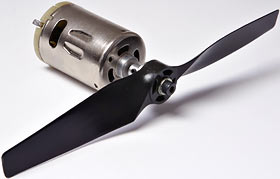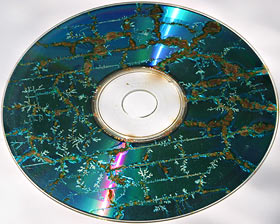
Atomic I/O letters column #35
Originally published in Atomic: Maximum Power Computing Reprinted here July 2004. Last modified 16-Jan-2015.
Con-tact!
I'm planning to do a case mod and mount one of those model R/C electric motors on the side of my case, with a tri-bladed propeller.
The case is made out of 2mm steel and I can not, for the life of me, figure out a good way to mount this motor in the side of the case. Would you have any ideas? Also, would the magnetism of the motor ruin anything in the computer?
Robert

Why talk about CFM when you can talk about thrust?
Answer:
I presume you're intending to run the motor from about 1.5 volts, whenever
you want to be able to hear yourself think.
Standard motors made for R/C cars and planes have screw holes in the front face, which are what you're meant to use to mount them.
You could try cutting a "spider" hole with a mounting plate in the middle connected to the rest of the case by four strips of steel, in the same way that the motor assembly in a conventional DC fan is connected to its frame. This'd be lousy for air flow, but this mod isn't all about efficiency in the first place.
Another drawback of this idea is that although it'd give you a prop sitting not too far out from the side of the case, it'd also give you a motor can sticking into the computer on the other side. That wouldn't be too bad if you just used a 400-size motor, though. I think 540-size is about as far as you want to take this idea.
(You can find data on lots of standard sealed-can motors on the Mabuchi site, by the way.)
Another option: Buy, or make, a motor mount. See the examples here, for instance.
Regular mounts aren't likely to have the reach you need, but the machining necessary isn't anything that you can't do with a Dremel, and a simple hefty mild steel cross-piece with a mount carved out of the middle of it and a bend to stand it sufficiently proud of the case side would get the job done. The materials would cost you not much from any decent hardware store.
The motor's magnetism won't be a problem. I've talked about this a bit in the past, here and here.
Ethernet exertions
Me and my mates have decided that once PCIe becomes mainstream we're going to have LAN parties at my house. My mates will all buy an extra PC and we'll use gigabit Ethernet connections between the computers. We also want to have a file server to which we will be sending gigabytes of data at a time.
Problem is, we also want to share an ADSL Internet connection on the network, but don't want to have two Ethernet cards in each computer as that would result in to much cable clutter. Can you buy gigabit ADSL routers?
Ben
Answer:
Gigabit Ethernet LANs are common already - regular PCI gigabit Ethernet
adapters are quite cheap these days. You won't get anything like the full
theoretical 120-odd megabytes per second of throughput out of a PCI gigabit
adapter, but plain old 100BaseT has considerable overhead, too. Gigabit
is much faster than 100BaseT, even on a plain PCI PC.
You won't need more than one network adapter in every box. An Internet connection can be shared over the gigabit network, just as it would over a 100 or even 10 megabit per second one.
The easiest way to hook this up would be with one dual-network-adapter computer, which wouldn't need even one gigabit adapter. Stick a couple of basic 10/100 cards in it, connect one to the DSL adapter and one to a port on your gigabit-capable switch, and use the Network Address Translation software of your choice (Windows Internet Connection Sharing ain't pretty, but it works) to make the connection available to the rest of the machines. The switch will prevent the slower connection from the 'Net sharer box from slowing down the rest of the network.
Mix and match
If I have 2x256Mb memory modules and 2x512Mb, would dual channel mode still work on an Intel 865G chipset? Or do all four modules have to be identical?
King
Answer:
Dual channel mode requires matched pairs of memory modules - with the same
number of banks of RAM, in particular. But provided you don't exceed the
maximum number of banks (also referred to, confusingly, as "sides") for
the motherboard, you can install two modules of one capacity and two modules
of another capacity without problems.
Dodgy drives
My motherboard seems to be stopping my 8X/4X CD-R/RW and my 8X DVD-ROM from reading burned CD's. I am using a Gigabyte GA-6VXC7-4X with a Celeron 600. I flashed my BIOS nearly 12 months ago and it is still the current version, because the motherboard is a few years old now.
Here is the puzzling part. The drives in the machine with the abovementioned motherboard will only read CDs which are burned at a speed equal to or lower that their top reading speed. However if put into a different machine, both drives work fine with any burned CD. I have tried flashing firmware and changing cables. I have also installed a 48x CD-RW into the problem machine, and it could read all of the burned CDs I have.
I have asked Gigabyte with no response, and also professionals who look at me funny and give responses like "reinstall Windows and your problem will be solved", which to me means that they have no idea of what I'm taking about.
Mark
Answer:
My first guess would be that this yet another of those mystifying problems
that's actually the fault of the Power Supply Unit. Dodgy PSUs can cause
all kinds of bizarre symptoms. Fortunately, they're also cheap and easy
to swap out.
It could be something more obscure, mind you, but I'd exchange the PSU first.
Brain transplant
I have a Socket 423 motherboard with a 1.6GHz Pentium 4 processor. Can I remove that processor and put it in a newer Socket 478 board?
Mark
Answer:
Absolutely not.
It is, however, possible to go the other way (not that you're likely to care); adapters that allow Socket 478 processors to be installed on old Socket 423 boards exist. Evergreen Technologies have one, for instance.
These sorts of "overdrive" upgrade kits have been around for a long time. They're never good value for money in pure bang-per-buck terms, but they're great for people, usually business users, who just want to throw some more CPU power into an old system without rebuilding it from the ground up.
Disaster recovery
I am desperate to recover my holiday photos. They were burned to CD-R from CompactFlash, as a multisession disc.
I attempted to burn onto another CD-R a selection of photos from the original disc. Because I don't have two drives, I wasn't able to do it on the fly. Roxio reads the source disc, caches it somewhere, and then asks for the blank, which it writes to.
It asked me for the original source disc, which I inserted - it promptly wrote to that disc, and apparently deleted all reference to the original photos.
Now my PC will not even recognise the disc as a CD.
Is there any way to recover the data?
Ben

Not every
CD's recoverable.
Answer:
Yes, recovery utilities for munged multisession CDs exist. The $US50
CD/DVD Diagnostic
from Arrowkey (um, actually from InfinaDyne,
now...) is widely recommended. Or, there's the freeware/shareware
IsoBuster.
(Full disclosure: I actually only pointed Ben to CD/DVD Diagnostic. He then found IsoBuster for himself. And it worked!)
Cheap screens
I'm thinking that my final monitor upgrade (well, until 53 inch OLED panels are $US99 after rebate) will be to a 21 inch tube.
I find these are surprisingly inexpensive when sold as "refurbished" or used. 21" Trinitrons with flat tubes sell for little more than half their new price. They're even cheaper by mail, but I suspect shipping negates any discount.
However, at that low a price, I wonder about the history and future of the item. They usually only put 30 to 90 day warranty behind refurbished goods, and the box isn't marked with the repairs performed. Are these a safe purchase, a "spend the extra $50 for the extended warranty" purchase, or should I save up for a new one?
Foul [probably not his or her real name]
Answer:
There's no way to truly rejuvenate a CRT. They get darker and darker and
darker, and then they die. The longer a CRT has been on, the darker it'll
be. A technician can tweak up the electron gun voltage to brighten an old
tube, but that shortens its life further.
If a monitor started out with an ultra-bright pro-quality aperture grille tube and only has a couple of years on it, though, it'll still be more than good enough for use by anyone who's not a complete colour calibration fascist.
Everything else about a CRT monitor can be fully refurbished, though I doubt any refurbishers go through the things replacing all of the electrolytic capacitors whether or not they seem to be off-value, just in case they're half way to drying out.
If you buy from a reputable dealer and get a good price (eBay dealers with lots of positive feedback often offer really good prices), and if it's practical for you to take the thing back if it dies (an eBay purchase from the other side of the country is obviously not actually going to be economically returnable, unless the dealer goes mad and pays for shipping), then there's really not much downside to these deals. Recognise that it might indeed drop dead two days after the warranty expires, maybe pay a bit extra for an extended warranty, keep an emergency screen in reserve in the cupboard, and you'll be fine.

